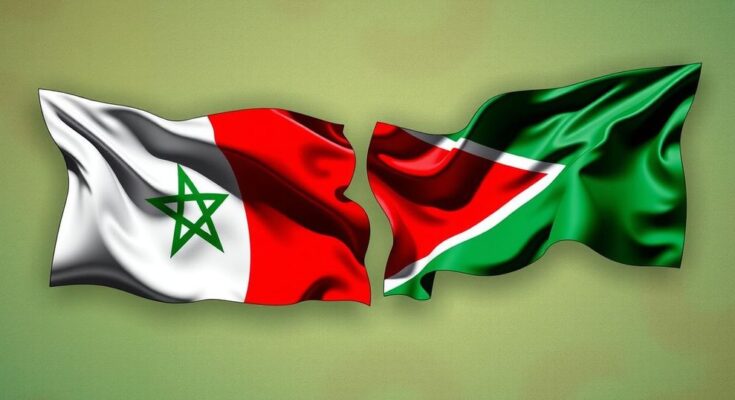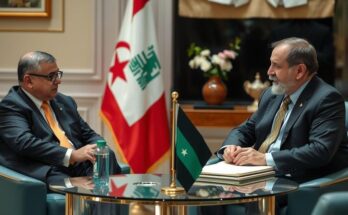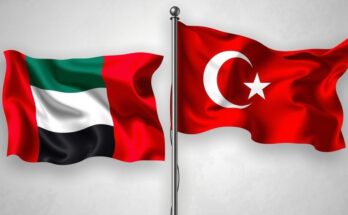Morocco and Mauritania share a strategic relationship fundamental to Maghreb regional stability. Their ties encompass cultural, economic, and security dimensions, providing a framework for cooperation amid external pressures. Recent diplomatic engagements indicate a positive trend reinforcing their collaboration in addressing common challenges while leveraging economic opportunities, particularly through joint initiatives like the Dakhla Atlantic port and regional infrastructure projects.
The strategic relationship between Morocco and Mauritania has taken on heightened importance, particularly in the context of regional integration in the Maghreb. With Mauritania positioned between Algeria and Morocco, it plays a pivotal role in promoting stability and addressing security challenges, even amid pressures from various stakeholders. The ambiguity surrounding its political and economic interests complicates its involvement, yet recent diplomatic gestures signal a warming of ties, notably following an unofficial visit by Mauritanian President Mohamed Ould Ghazouani to King Mohammed VI of Morocco.
Historically, Morocco and Mauritania have shared significant cultural, religious, and economic ties, underpinned by a partnership that enhances their security and development prospects in North Africa. Their geographical proximity and common interests regarding issues such as terrorism and organized crime necessitate collaboration on security matters. Mauritania’s strategic position, bordered by Algeria and the Moroccan Sahara, requires it to navigate diplomatic tensions while maintaining a stance of neutrality in the Western Sahara dispute.
The bilateral relationship is fortified through initiatives aimed at fostering economic development, such as the regional gas pipeline project connecting Nigeria with Europe. This cooperation aims to stimulate trade and reinforce economic ties. Moreover, projects like the Dakhla Atlantic maritime port aim to bolster maritime connectivity, positioning both nations within the global trade network. For Mauritania, engaging in Morocco’s economic initiatives presents an opportunity to access new markets and strengthen regional ties.
Beyond economics, the Morocco-Mauritania strategic partnership involves comprehensive security cooperation. Both nations recognize the importance of working together to effectively address threats such as arms smuggling, climate change, and regional terrorism. Military and naval collaborations further serve to develop a robust security framework within the Sahel and West African regions.
The relationship encapsulates a mutual vision, promoting sustainable development through cooperative efforts in various sectors, including green energy and tourism. By engaging in joint initiatives, Morocco and Mauritania are nurturing resilience against both traditional and non-traditional security challenges while also enhancing their economies through knowledge sharing and innovation.
In summary, Moroccan-Mauritanian relations stand as a model for regional cooperation, blending shared strategic objectives with mutual benefits. The ongoing projects and bilateral efforts illustrate the potential for an integrated approach to regional challenges, paving the way for increased stability and prosperity across North Africa. However, to fully realize this partnership, a dynamic political framework will be necessary to continue fostering collaboration and leveraging economic synergies for long-term growth and regional integration.
The geopolitical landscape of the Maghreb region has been markedly influenced by the historical and contemporary dynamics of Moroccan and Mauritanian relations. Since the onset of the Western Sahara conflict, Mauritania’s role has evolved as a mediator and participant in peace efforts, given its border with both Algeria and the contested territory. The countries share deep-rooted historical connections, shaped by mutual interests that extend into security, economic cooperation, and cultural ties. As both nations face external pressures, particularly from Algeria, it is imperative to examine how their relationship can serve as a stabilizing force amidst ongoing challenges in the region.
In conclusion, the strategic relationship between Morocco and Mauritania exemplifies the potential of regional cooperation rooted in shared interests and historical connections. As both nations work toward enhancing their diplomatic, economic, and security collaboration, their partnership could serve as a cornerstone for stability within the Maghreb. However, achieving deeper integration will require an adaptable political approach to align their strategic objectives and foster sustainable growth that benefits both countries and the wider region.
Original Source: moderndiplomacy.eu




